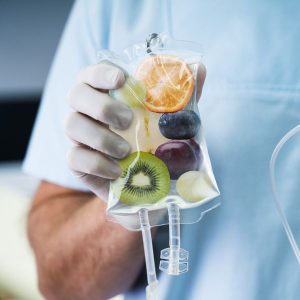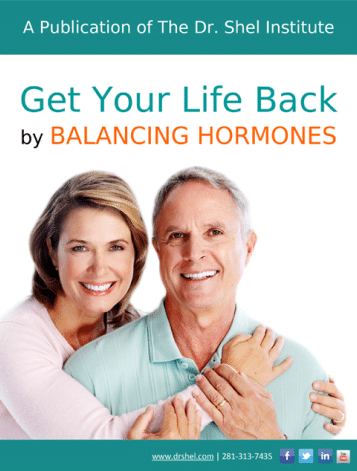Hormonal Imbalances Contribute To A Number Of Unpleasant Issues, Such As Fatigue and Weight Changes. But What About Cancer? Should You Consider Bioidentical Hormone Therapy? We Have The Answers!
 Did you know that approximately one in eight women wind up with breast cancer at least once in their lives?
Did you know that approximately one in eight women wind up with breast cancer at least once in their lives?
Though there has recently been an increase in cases in younger women, most of the time, a woman is over 40 when diagnosed, thus the breast cancer screening recommendations.
When you think about it logically, this makes sense because your body starts going through a major hormone shift – menopause – around this time. And even before your menstrual cycle stops, your ovaries start producing less estrogen, usually about eight to 10 years before menopause actually occurs.
So, is there a scientific connection between the two? And should you start bioidentical hormone therapy to combat it?
Let’s explore everything you should know about the link between breast cancer and hormonal imbalance.
Your hormones require a delicate balance to keep you healthy and possibly prevent health issues.
What Causes a Hormonal Imbalance?
Various factors may contribute to a hormonal imbalance.
-
Menopause
While you’re losing estrogen before menopause, you’re also producing less progesterone, which is where the problem comes into play. You may become estrogen-dominant when your progesterone is low.
Estrogen stimulates cell growth, particularly whenever your progesterone is low. Thus the increased risk of breast cancer. Your risk may be greater if you had your ovaries removed because you’ll produce less progesterone.
You should know your body produces multiple types of estrogen, including estriol, estrone, and estradiol.
Let’s start with the most potent form – estradiol, which is a balanced form of estrogen inhibiting and stimulating cell growth, preventing irregular cell growth. With the other two forms, one is stimulating cell growth (estrone), while the other (estriol) is inhibiting it.
Therefore, when you’re producing more estrone, your body is stimulating breast cell growth, especially considering it’s a more potent form than estriol.
-
Other Factors
Other factors include taking in xenoestrogens, either through pesticides or pollutants. Taking oral contraceptives can also elevate your chances of breast cancer by causing a hormonal imbalance.
Understanding Estrogen Dominance
Dr. John Lee, a revolutionary in natural hormones, invented the phrase “estrogen dominance,” which is a bit misleading because that sounds like your estrogen levels are high, but, in all reality, with it, your levels may be low as well; though, they could be normal or high. The sole diagnostic criteria for this issue is that your progesterone is low.
Most commonly, women experience and have normal estrogen levels with low progesterone. Often, estrogen dominance happens in women who’ve already had children or are nearing middle-aged, but it can happen no matter your age.
Furthermore, women of any age can have low levels of both estrogen and progesterone, but it happens more frequently in menopausal women.
A Bit More About Progesterone’s Role
As briefly mentioned, while estrogen is looked at as the aggressor when it comes to cancer, it’s necessary for cellular growth during your reproductive years, and one form helps to regulate it. Progesterone, however, is the key player in regulating cell growth.
“How so?” you ask.
During the first half of your cycle, estrogen is dominant and works to grow your uterine lining. Then, progesterone becomes dominant during the second half of your cycle to induce endometrial shed. Besides your uterine lining, estrogen is also stimulating the growth of your milk ducts, causing your breasts to swell.
Simply put, estrogen = growth, while progesterone = no growth. Therefore, in terms of checks and balances with your breast tissue, if you don’t have enough progesterone to combat estrogen, there’s overstimulation.
Signs You Have a Hormonal Imbalance
All of the following are signs of a hormonal imbalance:
- Inability to lose weight/undesired weight gain
- PMS symptoms
- Premenstrual bloating or weight gain
- Heavy or painful periods
- Irregular menstrual bleeding
- Mood swings
- Depression
- Anxiety
- Low libido
- Fatigue
- Tender and/or fibrocystic breast tissue
- Sleep disturbances
- Are sick more frequently/low immunity
- Migraines
- Have endometriosis, ovarian cysts, or fibroids
Hair loss is one we’d like to particularly mention, though this can occur if you have a nutrient deficiency, especially with zinc, B vitamins, or iron. You may also develop it if you have a thyroid disorder, such as hypothyroidism.
A decrease in estrogen contributes to hair loss because this hormone promotes hair growth and prevents hair shedding. Not to mention, as it lessens, your hair follicles may shrink, causing your hair to be finer.
Speaking along the lines of follicles, estrogen has a hand in nourishing and protecting them to help your hair remain strong. Moreover, as estrogen levels decrease, your hair may become weaker.
Treatment for a Hormonal Imbalance, Including Bioidentical Hormone Therapy
Firstly, if you’re having symptoms, you’ll want to visit Dr. Shel for hormone testing to determine your hormone levels and if you’re estrogen dominant.
You can get a general idea if you have a deficiency by taking our free self-assessment here.
We should note that whenever you receive any type of hormone replacement therapy, including bioidentical hormone therapy, you’re given both estrogen and progesterone since these two even each other out, that is, if you have a uterus.
The reason is that, when given alone, estrogen increases your risk of uterine cancer when there’s not enough progesterone to counteract it.
-
Estrogen Replacement
Estrogen replacement therapy can help ease the unwanted symptoms you experience when your levels are low.
Replacing this hormone also helps maintain bone density to prevent fractures because it slows bone reabsorption, decreases bone loss, and enhances calcium absorption.
Elevating your level through therapy assists your cardiovascular system by protecting your blood vessels and heart. Specifically, estrogen therapy is known to improve your cholesterol levels and may even lower your chances of heart disease as a result.
In addition, estrogen therapy may facilitate maintaining your brain function because it lowers your likelihood of dementia and general cognitive decline by protecting neurons, regulating neurotransmitters, and supporting neuroplasticity.
-
Progesterone Replacement
Progesterone replacement can assist with the balancing act to help lessen your chance of developing breast cancer, but not all of these hormone replacements are the same. The progestins you’re used to seeing in birth control – and also that are given in synthetic hormone replacements – aren’t natural or identical.
And when it’s not a bioidentical hormone, your risk of breast cancer increases by 26 percent when taking it. Another study showed your likelihood of developing breast cancer triples from taking progestin compared to when you take estrogen only.
Shockingly, the possibility of developing breast cancer when you’re taking Provera (a synthetic progesterone) increases the chances of developing breast cancer by 800%.
With all that said, progesterone, when bioidentical, protects against breast cancer because it does all the following:
- Converts estrone to inactive (sulfated) form
- Converts estradiol to estrone
- Converts estrone to estriol
- Activates gene p53, which protects against cancer
- Decreases estrogen receptors’ sensitivity
- Improves your sleep and manages stress levels
-
Other Tips
Along with bioidentical hormone therapy, you can also reduce your risk through these methods:
- Finding healthy ways to manage stress
- Minimizing chemical use, including pesticides
- Reducing pollutant exposure
- Exercising regularly
- Maintaining a healthy weight (excess weight heightens estrogen production)
- Opting for organic, hormone-free foods
Doesn’t Estrogen Replacement Therapy Increase Your Risk of Cancer?
If you take a non-bio-identical hormone, this is true. Synthetic estrogen, like Premarin, consists of 48 percent estrone, which has a stimulatory effect. Essentially, this hormone replacement therapy is a double hit – increasing the bad estrogen while decreasing the good – creating an ideal environment for breast cancer to develop.
On the other hand, bioidentical estrogen, particularly when you receive it along with progesterone at the correct dosage, inhibits cell growth. Consequently, it not only won’t cause breast cancer, but it’ll protect against it.
Learn more here: Combat Cognitive Decline with Bioidentical Hormone Therapy
Reaching Out for Help from Dr. Shel
 If you’re suffering from hormonal deficiency symptoms, reach out to Dr. Shel Wellness & Aesthetic Center today!
If you’re suffering from hormonal deficiency symptoms, reach out to Dr. Shel Wellness & Aesthetic Center today!
You’ll benefit from fewer unwelcomed symptoms of a hormonal deficiency, AND you’ll even reduce your risk of breast cancer when you opt for bioidentical hormone therapy composed of a happy balance between estrogen and progesterone (if you still have a uterus, that is).
Without a uterus, you may only need estrogen. Plus, we offer various options, including BioTe Pellets.
If you have some symptoms but aren’t suffering from a hormone deficiency, Dr. Shel offers other treatments that may ease your symptoms, such as IV therapy to correct nutrient deficiencies.
Choosing a medical provider isn’t easy, especially when you want one who’ll listen and provide an effective solution. Fortunately, Dr. Shel has a solid reputation for getting to the source of the problem and supplying results.
Call (346) 534-6956 today to book your consultation!


















